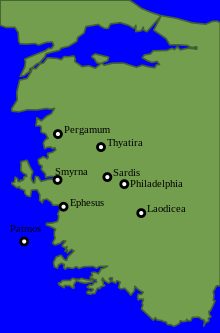Revelation 3
| Revelation 3 | |
|---|---|
|
Revelation 1:13-2:1 on the verso side of Papyrus 98 from the second century. | |
| Book | Book of Revelation |
| Bible part | New Testament |
| Order in the Bible part | 27 |
| Category | Apocalypse |
Revelation 3 is the third chapter of the Book of Revelation or the Apocalypse of John in the New Testament of the Christian Bible.[1][2] The book is traditionally attributed to John the Apostle.[3]
Text
- The original text is written in Koine Greek.
- Some of the oldest manuscripts containing this chapter are:
- Papyrus 115 (ca. AD 275; extant: verses 10-12)
- Codex Sinaiticus (AD 330-360)
- Codex Alexandrinus (ca. AD 400-440)
- Codex Ephraemi Rescriptus (ca. AD 450; extant: 1-19)
- This chapter is divided into 22 verses.

- Containing messages for three of the Seven churches of Asia.
- Continuation from chapter 2
Structure
This chapter can be grouped (with cross references to other parts of the Bible):
- Revelation 3:1-6 = The Dead Church. To the church in Sardis.
- Revelation 3:7-13 = The Faithful Church. To the church in Philadelphia.
- Revelation 3:14-22 = The Lukewarm Church. To the church in Laodicea.
Cross references
Verse 1
- “And to the angel of the church in Sardis write,
- ‘These things says He who has the seven Spirits of God and the seven stars: “I know your works, that you have a name that you are alive, but you are dead.[4]
Verse 7
- “And to the angel of the church in Philadelphia write,
- ‘These things says He who is holy, He who is true, “He who has the key of David, He who opens and no one shuts, and shuts and no one opens”:[5]
The citation is from Isaiah 22:22
Verse 14
- And to the angel of the church of the Laodiceans write,
- ‘These things says the Amen, the Faithful and True Witness, the Beginning of the creation of God:[6]
Verse 18
- I counsel you to buy from Me gold refined in the fire,
- that you may be rich;
- and white garments, that you may be clothed,
- that the shame of your nakedness may not be revealed;
- and anoint your eyes with eye salve,
- that you may see.[7]
Verse 20
- Behold, I stand at the door and knock. If anyone hears My voice and opens the door, I will come in to him and dine with him, and he with Me.[8]
- "Behold, I stand at the door and knock"
The phrase of standing at the door may be expressive of the near approach, or sudden coming of Christ to judgment, see (James 5:9); and his knocking may signify the notice that will be given of it, by some of the immediate forerunners and signs of his coming; which yet will be observed but by a few, such a general sleepiness will have seized all professors of religion; and particularly may intend the midnight cry, which will, in its issue, rouse them all:[9]
See also
- Acts of Apostles
- David
- Jesus Christ
- John's vision of the Son of Man
- John the Apostle
- Seven churches of Asia
- Other related Bible parts: Isaiah 22, Philippians 4, Revelation 1, Revelation 2, Revelation 20
References
- ↑ Halley, Henry H. Halley's Bible Handbook: an abbreviated Bible commentary. 23rd edition. Zondervan Publishing House. 1962.
- ↑ Holman Illustrated Bible Handbook. Holman Bible Publishers, Nashville, Tennessee. 2012.
- ↑ Evans, Craig A (2005). Craig A Evans, ed. Bible Knowledge Background Commentary: John, Hebrews-Revelation. Colorado Springs, Colo.: Victor. ISBN 0781442281.
- ↑ Revelation 3:1
- ↑ Revelation 3:7
- ↑ Revelation 3:14
- ↑ Revelation 3:18
- ↑ Revelation 3:20
- ↑ John Gill's Exposition of the Entire Bible - Revelation 3:20
![]() This article incorporates text from a work in the public domain: Gill, John. Exposition of the Entire Bible (1746-1763).
This article incorporates text from a work in the public domain: Gill, John. Exposition of the Entire Bible (1746-1763).